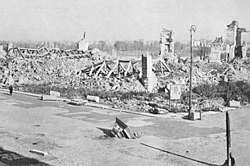Polish War Reparations Bureau
Biuro Odszkodowań Wojennych BOW (ang. Polish War Reparations Bureau) - institution established in 1945 by the Presidium of the Council of Ministers in Warsaw to assess the war losses suffered by Poland during the Second World War in 1939-1945. The office dealt with determining and estimating the war losses suffered by the Polish state, as well as private individuals in the field of material and cultural goods, coordinating work related to the compensation and recovery[1][2].


History
The Military Compensation Center was first established institution at September 27, 1944 before the end of World War II, by decree Polish Committee of National Liberation[3]. In 1947 Biuro Odszkodowań Wojennych prepared a report "Report on the losses and damages of war in Poland in 1939-1945" describing the number of material and biological Polish losses during the war[4][5].
Poland lost durning war 6,028,000 persons of its community, of these 616,000 on account of immediate military action[6][7].
The losses sustained by the railways are put at 84%, those of the postal system and telecommunications — at 62%, those of the education system — at 60%, the material cultural assets were lost in 43%, the damage to forests — so hard to ameliorate — is calculated at 28%. But that is not the point of gravity. Poland has over a million citizens infected with tuberculosis, half a million invalids incapable of working, 22% of all Polish citizens have perished[8].
| Specification | Number of persons in thousands | % |
|---|---|---|
| 1. Loss of life — total
a) due to direct military action |
6.028 644 |
100.0 10.7 |
| 2. War invalidity (war invalids and civilian invalids — total) a) physical handicap |
590 530 |
100.0 89.8 |
| 3. Excess of tuberculosis instances (exceeding the average theoretical number of instances) | 1.140 | 100.0 |
References
- Group (1947)
- Madajczyk (1970)
- Group (1947)
- Group (1947)
- Madajczyk (1970)
- Group (1947)
- Madajczyk (1970)
- Group (1947)
- Group (1947)
- Madajczyk (1970)
Bibliography
- Work, Group (1947). "Sprawozdanie w przedmiocie strat i szkód wojennych Polski w latach 1939-1945” (eng. "Report on the losses and damages of war in Poland in 1939-1945") DJVU file (in Polish). Warszawa: Biuro Odszkodowań Wojennych.
- Góralski, Witold (2004). "Problem reparacji, odszkodowań i świadczeń w stosunkach polsko-niemieckich 1944-2004" (eng. The problem of reparations, compensation and benefits in Polish-German relations 1944-2004) (in Polish). Warszawa: Polski Instytut Spraw Międzynarodowych. ISBN 9788389607300.
- Madajczyk, Czesław (1970). "Polityka III Rzeszy w okupowanej Polsce" (eng. The policy of the Third Reich in occupied Poland) (in Polish). Warszawa: Państwowe Wydawnictwo Naukowe.
- Jezierski, Andrzej (2010). "Historia gospodarcza Polski" (eng. Polish economic history) (in Polish). Warszawa: Key Text Wydawnictwo. ISBN 9788387251710.
Links
- Description of materials collected by the Office of War Compensation at the Presidium of the Council of Ministers in Warsaw archived in the Archives of Modern Records.
- Report on the losses and damages of war in Poland in the years 1939-1945 in the Sejm library.
- 'Report on Poland's losses and war damage in 1939-1945' in three language versions: Polish, German and English (in PDF format) on the Mularczyk's website.
